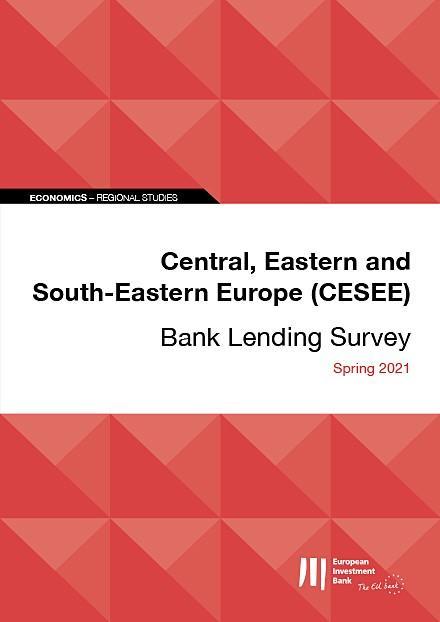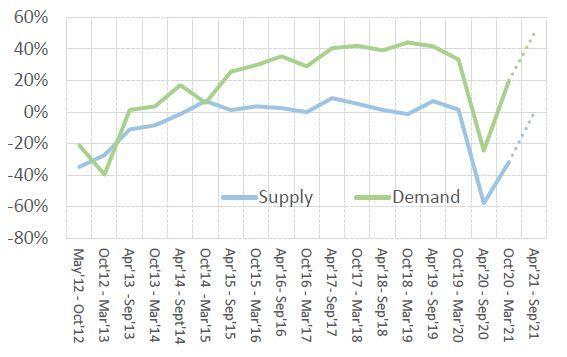
- Following the COVID-19 economic shock, regulatory and financial support have been effective in preserving bank lending activity in Central, Eastern and South-eastern Europe
- Banks in the region report an increase in demand for credit while they have tightened again credit standards on new lending
- International banking groups continue to show substantial commitment to the region over the medium term, with their strategies tilted towards expansion or stability
Today the EIB published the Spring edition of its regular bank lending survey for Central, Eastern and South-eastern Europe. The survey provides insights into banking group activities, their subsidiaries as well as local banks, including their expectations on lending. It analyses demand and supply for financing – looking at SMEs, corporates, as well as household portfolios - banks’ funding conditions, assessments of market potential and positioning as well as the development of non-performing loans.
The latest edition of the survey shows that credit standards are tightening for smaller companies and corporates whilst they are expected to be more accommodating for households. At the same time demand for financing and loans is increasing across all client portfolios. International banking groups show a strong commitment to the region.
Read the full survey and analysis here.
Demand and supply conditions - net percentages

Note: Positive figures refer to increasing (easing) demand (supply)
Source: EIB CESEE Bank Lending Survey - spring 2021
“Our latest survey shows that the policy responses to the COVID-19 shock have been instrumental in limiting the most abrupt and negative effects for the banking sector in Central, Eastern and South-eastern Europe in 2020 and early 2021,” said EIB Vice-President, Ricardo Mourinho Félix, responsible for economic studies. “In the face of tightening lending for smaller businesses and corporates, and ending credit moratoria, the region can count on its international partners. The EIB Group will continue to provide support, in particular through the pan-European Guarantee Fund, and our regular investment and advisory activities, to reignite the investment needed to help the region’s economies recover and become greener, digital and more competitive,” he added.
“The financial system in Central, Eastern and South-eastern Europe is showing a remarkable resilience in face of one of the largest economic shocks it has ever faced. International banks continue to show their commitment to the region. Nonetheless our survey shows weak investment demand and still tightening conditions on loans to smaller business and corporates. A continued joint effort by the public and private sector as well as multilateral partners is needed to boost investment activities, to help the region not only recover but to further prosper and meet the challenges of the green and digital transition,” added EIB Chief Economist Debora Revoltella.
The CESEE Bank Lending Survey is part of regular reporting from the EIB, International Monetary Fund (IMF), European Bank for Reconstruction and Development (EBRD) and World Bank for the European Bank Coordination “Vienna Initiative”, a framework for safeguarding the financial stability of emerging Europe. The survey for the new edition of the report was conducted as the COVID-19 pandemic unfolded. Previous editions are accessible here.
What are banking groups future plans for the region?
The survey results show that international banking group strategies and commitment to the Central, Eastern and South-eastern Europe are tilted towards expansion or stability. Nonetheless, COVID-19 has brought about a deceleration in activities to increase capital.
How is the demand and supply of loans developing?
Subsidiaries of international banking groups and local banks report an increase in demand for credit. At the same time, banks have tightened again their conditions for loans across the board, albeit less than in the first phase of the COVID-19 crisis.
In the past six months, there was less demand for investment activities, whilst working capital needs continued to contribute positively to overall demand for loans. Housing market prospects substantially supported demand, thus boosting mortgage demand. In the past six months, local market outlooks and an increase in non-performing loans were the main limiting factors for the tightening supply of loans. Looking ahead, credit standards are expected to tighten further only for corporates and smaller and medium-sized businesses.
For more details read the full survey and analysis here.
NPLs stable in central and south-eastern Europe during Covid-19 pandemic (ebrd.com)
https://www.imf.org/en/Countries/Regions/Europe
Background information
About the EIB Economics Department
The EIB Economics Department provides economic research and studies, as well as unique analysis of investment activities in the European Union and beyond, and supports the Bank in its operations and in the definition of its positioning, strategy and policy. Chief Economist Debora Revoltella heads the Department, a team of 40 economists.
About the EIB CESEE Bank Lending Survey
The EIB CESEE Bank Lending Survey is a unique, bi-annual survey of some 90 banks, banking groups and financial institutions in Central, Eastern and South-eastern Europe. The latest edition of the survey was conducted in Match 2021 and collects information about the period from October 2020 to March 2021as well as expectations for the period from March to September 2021. The survey collects information on credit standards, credit terms and conditions, approval rates and the various factors that may be responsible for changes, including domestic and international elements. Demand for loans is also investigated in terms of loan applications as well as their quality. The survey also includes specific questions on credit quality and the funding conditions for banks. It is designed to build a panel of observations to support time series analysis, observations that can provide an almost real-time assessment of the health of the banking sector in the CESEE region. The CESEE Bank Lending Survey was developed and is managed by the EIB Economics Department, and is part of a series of reports for the Vienna Initiative.